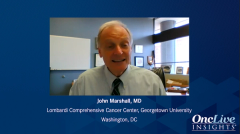
Insights on Existing and Prospective Second-line Treatment Strategies for Patients With ESCC
Thoughtful discussion of existing and emerging second-line treatment options for patients with metastatic ESCC
Episodes in this series
Transcript:
John Marshall, MD: Initial lines of therapy are combinations of chemotherapy and immunotherapy. Now you move into subsequent lines of therapy, and there are other drugs: irinotecan, taxanes, platinums. There are other approaches with combinations of immunotherapies that are being explored. Beyond that first line, the benefit rate doesn’t manage to stay up or stay high for very long, so we want that optimum first-line treatment of choice if we can.
When I’m thinking about managing a first-line patient, I like to know the CPS [combined positive score] and the PD-L1 score. I have approval regardless of the CPS score, and there are pretty good data that in squamous cell cancers, immunotherapies work. My enthusiasm for immunotherapies certainly goes up with those patients who have >5, even more, >10, on their CPS. That’s what I’d start with. These patients need a response, and in some patients, that immunotherapy also generates a durable response. After I get that initial positive benefit in the first 3 to 4 months, I might back off and—as we do in colorectal cancer—take a maintenance-like approach with immunotherapy and an oral fluoropyrimidine, or just immunotherapy single agent so that then I can rechallenge with a chemotherapy or switch to other cytotoxic drugs through the sequence beyond the first line.
If you have a patient with metastatic or locally advanced squamous cell cancers of the esophagus, you think, “What cards do I have on the table, and when do I play what?” For most patients, that first-line treatment of choice is going to be doublet chemotherapy, and there you have a carbo-Taxol approach, or fluoropyrimidine and a platinum. We have pretty good evidence that immunotherapy should be added to that in that first-line setting. Whether you then go through a maintenance phase if you have a good response, and maintain the immunotherapy or not, most of us would maintain something through there. Ultimately, they’ll progress. If you haven’t used up your platinum and your taxane, you certainly still have those as a rechallenge.
The other alternative therapies are pretty limited to things like irinotecan, or other kinds of platinum that you didn’t give, or fluoropyrimidine if you haven’t brought that in. There aren’t many choices beyond those initial lines of therapy in patients with this disease. You want to get your best bang for your buck early on, so you can get your best initial response and then hold on to that with your other drugs and rechallenge, or use drugs you haven’t used in your first-line therapy.
As with all our solid tumors, we use CT scanning, endoscopy, patient symptoms, and sometimes cancer markers, to determine if a patient is benefiting from the treatment. It comes down to performance status and CT scanning as the primary way that we’re watching out for patient response and benefit. We always have to keep in the back of our heads that, sometimes with immunotherapy, we can see an early uptick. I don’t think that’s a very common phenomenon, so we’re looking for tumor regressions or stable disease and improved outcomes. When that begins to turn, it’s usually straightforward to see that, and you know you need to switch treatments.
We’re all working as hard as we can to try to identify new therapies and new approaches for our patients with esophageal cancers, particularly the squamous cell type. This is where it’s important for us to do the broad molecular profiling, not just the 3 that you have to do: MSI [microsatellite instability], PD-L1, and HER2 [human epidermal growth factor receptor 2]. We’re looking at new approaches around the other targets and new patterns that may emerge. Certainly, combos of chemotherapy and immunotherapy and combos of immunotherapy are being done. Unlike with some of our GI [gastrointestinal] cancers, where we get into third and fourth lines, with this disease we rarely get past the second line. Begin looking for novel approaches early on in your patients, so you have something in your hip pocket if it’s out there for that patient.
As we see new approvals occur, we’re getting even more studies, so this landscape has gotten fairly complicated regarding who to give what to. In this patient population, squamous cell cancers of the esophagus with a metastatic disease, we have good, solid evidence that immunotherapy combined with chemotherapy is going to be the standard of care for first-line therapy. We have subsequent lines of therapy out there for our patients to extend that survival and improve their quality of life.
Thank you all very much. Thanks to our viewing audience for joining us. We hope you found this OncLive® My Treatment Approach program to be useful and valuable to the management of your patients with esophagus squamous cell carcinoma. Thanks very much.
Transcript edited for clarity.





































